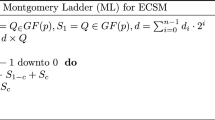Abstract
Elliptic curve cryptography (ECC) is one of the most popular asymmetric key cryptography techniques used in secured data communications. The scalar multiplication is the most expensive operation in the ECC. In this paper, we propose a low cost hardware for scalar multiplication in Affine coordinates based ECC. Here, we use a reconfigurable Galois field (GF) arithmetic circuit, which performs various GF arithmetic operations such as addition, multiplication, inverse, and fused multiply add (FMA) using a same set of hardware circuit. Instead of using a number of multipliers and adders in point addition/doubling, we have used only one reconfigurable GF arithmetic circuit. The existing and proposed designs are implemented in 45 nm CMOS technology using Cadence. The synthesis results show that the affine co-ordinate based proposed \(GF(2^{163})\) scalar multiplier achieves \(69\%\) of reduction in the switching power dissipation as compared with the Lopez-Dahab projective co-ordinates based conventional design in 45 nm CMOS technology.
Access this chapter
Tax calculation will be finalised at checkout
Purchases are for personal use only
Similar content being viewed by others
References
Mohamed Asan Basiri, M., Shukla, S.K.: Hardware optimization for crypto implementation. In: IEEE International Symposium on VLSI Design and Test, pp. 1–6 (2016). https://doi.org/10.1109/ISVDAT.2016.8064877a
López, J., Dahab, R.: Fast multiplication on elliptic curves over GF(2m) without precomputation. In: Koç, Ç.K., Paar, C. (eds.) CHES 1999. LNCS, vol. 1717, pp. 316–327. Springer, Heidelberg (1999). https://doi.org/10.1007/3-540-48059-5_27
Hong, J., Wu, W.: The design of high performance elliptic curve cryptographic. In: 52nd IEEE International Midwest Symposium on Circuits and Systems, pp. 527–530 (2009). https://doi.org/10.1109/MWSCAS.2009.5236038
Ansari, B., Wu, H.: Efficient finite field processor for \(GF(2^{163})\) and its VLSI implementation. In: Fourth IEEE International Conference on Information Technology, pp. 1–6 (2007). https://doi.org/10.1109/ITNG.2007.83
Venugopal, E., Hailu, T.: FPGA based architecture of elliptic curve scalar multiplication for IOT. In: IEEE International Conference on Emerging Devices and Smart Systems, pp. 178–182 (2018). https://doi.org/10.1109/ICEDSS.2018.8544305
Ansari, B., Hasan, M.A.: High performance architecture of elliptic curve scalar multiplication. IEEE Trans. Comput. 57(11), 1443–1453 (2008)
Zhang, Y., Chen, D., Choi, Y., Chen, L., Ko, S.: A high performance pseudo-multi-core ECC processor over \(GF(2^{163})\). In: IEEE International Symposium on Circuits and Systems, pp. 701–704 (2010). https://doi.org/10.1109/ISCAS.2010.5537486
Li, L., Li, S.: High-performance pipelined architecture of elliptic curve scalar multiplication over \(GF(2^m)\). IEEE Trans. Very Large Scale Integr. (VLSI) Syst. 24(4), 1223–1232 (2016)
Rashid, M., Hazzazi, M.M., Khan, S.Z., Alharbi, A.R., Sajid, A., Aljaedi, A.: A novel low-area point multiplication architecture for elliptic-curve cryptography. Electronics 10(2698), 1–16 (2021)
Song, L., Parhi, K.K.: Low-energy digit-serial/parallel finite field multipliers. J. VLSI Signal Process. Syst. Signal Image Video Technol. 19, 149–166 (1998). https://doi.org/10.1023/A:1008013818413
Lin, C.-C., Chang, F.-K., Chang, H.-C., Lee, C.-Y.: An universal VLSI architecture for bit-parallel computation in \(GF(2^m)\). In: IEEE Asia-Pacific Conference on Circuits and Systems, pp. 125–128 (2004). https://doi.org/10.1109/APCCAS.2004.1412708
Inumary, H., Mohamed Asan Basiri, M.: Reconfigurable hardware design for polynomial Galois field arithmetic operations. In: IEEE International Symposium on VLSI Design and Test, pp. 1–5 (2020). https://doi.org/10.1109/VDAT50263.2020.9190485
Mohamed Asan Basiri, M., Shukla, S.K.: Flexible VLSI architectures for Galois field multipliers. Integr. VLSI J. 50, 109–124 (2017)
Acknowledgements
This work is a part of sponsored project (IHUB-NTIHAC/2021/01/1) of C3I Center, IIT Kanpur. Also, this work is fully supported and funded by the same. We thank IHUB-NTIHAC, C3I Center of IIT Kanpur for the given support.
Author information
Authors and Affiliations
Corresponding author
Editor information
Editors and Affiliations
Rights and permissions
Copyright information
© 2022 The Author(s), under exclusive license to Springer Nature Switzerland AG
About this paper
Cite this paper
Inumarty, H., Mohamed Asan Basiri, M. (2022). Low Cost Hardware Design of ECC Scalar Multiplication. In: Shah, A.P., Dasgupta, S., Darji, A., Tudu, J. (eds) VLSI Design and Test. VDAT 2022. Communications in Computer and Information Science, vol 1687. Springer, Cham. https://doi.org/10.1007/978-3-031-21514-8_32
Download citation
DOI: https://doi.org/10.1007/978-3-031-21514-8_32
Published:
Publisher Name: Springer, Cham
Print ISBN: 978-3-031-21513-1
Online ISBN: 978-3-031-21514-8
eBook Packages: Computer ScienceComputer Science (R0)




